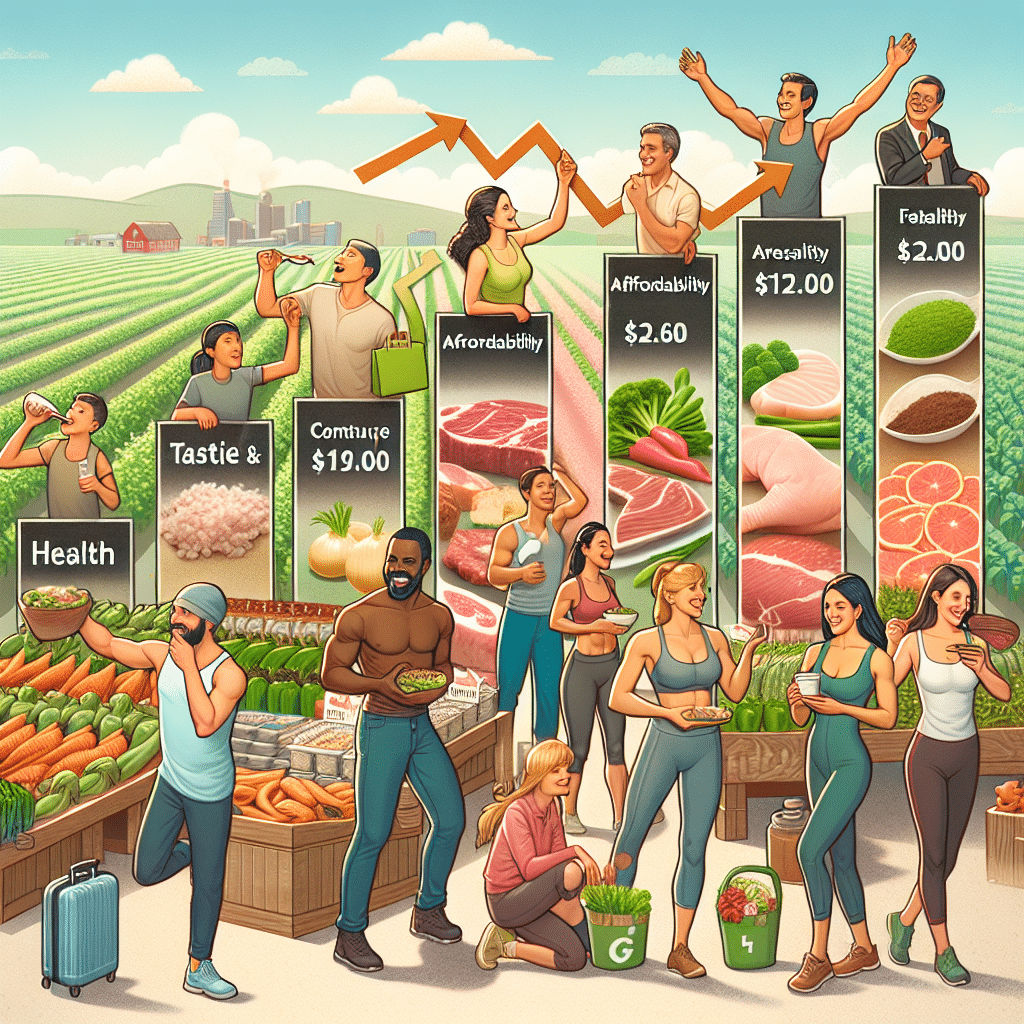Sustainable Protein Growth Driven by Health, Taste, Affordability
-
Table of Contents
- Sustainable Protein Growth: Prioritizing Health, Taste, and Affordability
- The Rise of Sustainable Protein Sources
- Health Benefits of Alternative Proteins
- Taste and Culinary Innovation
- Affordability and Accessibility
- Case Studies: Success Stories in Sustainable Protein
- Statistics: The Growing Demand for Sustainable Protein
- Challenges and Future Directions
- Conclusion: Embracing the Future of Protein
- Discover ETprotein’s Sustainable Protein Solutions
Sustainable Protein Growth: Prioritizing Health, Taste, and Affordability

The global demand for protein is on an unprecedented rise, driven by a growing population, increased awareness of health and nutrition, and the pursuit of sustainable living. As consumers become more conscious of their dietary choices, the protein industry is evolving to meet the needs of health, taste, and affordability without compromising on sustainability. This article delves into the innovative approaches and solutions that are shaping the future of protein consumption.
The Rise of Sustainable Protein Sources
Traditional sources of protein, primarily from animal-based products, are increasingly being scrutinized for their environmental impact, ethical concerns, and long-term sustainability. The quest for alternative protein sources has led to the exploration of plant-based proteins, edible insects, lab-grown meats, and more. These alternatives are gaining traction not only for their reduced ecological footprint but also for their potential health benefits.
Health Benefits of Alternative Proteins
Alternative protein sources often come with a host of health benefits. Plant-based proteins, for instance, are associated with lower levels of saturated fat and cholesterol, and higher levels of fiber and certain vitamins. Edible insects, while a less conventional choice, are rich in protein, vitamins, and minerals. Lab-grown meats promise to offer the same nutritional profile as traditional meats without the associated antibiotics and hormones.
Taste and Culinary Innovation
One of the biggest challenges facing sustainable proteins is consumer acceptance, particularly in terms of taste and texture. Food scientists and chefs are working tirelessly to create plant-based proteins that mimic the taste and mouthfeel of animal proteins. Innovations in food technology have led to the development of products like the Impossible Burger and Beyond Meat, which have been successful in appealing to both vegetarians and meat-eaters alike.
Affordability and Accessibility
For sustainable proteins to become a mainstay in diets globally, they must be affordable and accessible to the average consumer. Economies of scale, advancements in production technologies, and supportive policies can help reduce the cost of alternative proteins, making them competitive with traditional animal-based proteins.
Case Studies: Success Stories in Sustainable Protein
Several companies and initiatives have made significant strides in promoting sustainable protein consumption. Here are a few examples:
- Impossible Foods and Beyond Meat: These companies have popularized plant-based meat alternatives that are now available in supermarkets and restaurants worldwide.
- Entomo Farms: A leader in insect farming, providing a sustainable and high-protein alternative through products like cricket powder.
- Memphis Meats: Pioneering the field of cell-based meat, this company is working towards producing meat directly from animal cells, reducing the need for livestock farming.
Statistics: The Growing Demand for Sustainable Protein
Recent statistics highlight the burgeoning market for sustainable protein:
- The plant-based protein market is expected to reach USD 14.5 billion by 2025.
- 65% of consumers are trying to incorporate more plant-based foods into their diets.
- The edible insect market is projected to grow at a CAGR of 24.4% from 2020 to 2027.
These figures underscore the significant shift towards sustainable protein sources and the potential for continued growth in this sector.
Challenges and Future Directions
Despite the progress, there are challenges that need to be addressed to ensure the sustainable growth of the protein sector:
- Regulatory Hurdles: New food sources require approval from regulatory bodies, which can be a lengthy and complex process.
- Consumer Education: There is a need for widespread consumer education to overcome preconceived notions about alternative proteins.
- Research and Development: Continued investment in R&D is crucial for improving the quality and reducing the cost of sustainable proteins.
Looking ahead, the protein industry must focus on innovation, collaboration, and education to meet the growing demand for sustainable, healthy, tasty, and affordable protein options.
Conclusion: Embracing the Future of Protein
The future of protein is one that balances the needs of a growing population with the imperative of sustainability. Health, taste, and affordability are the pillars that will drive the growth of sustainable proteins. By investing in alternative sources, improving production methods, and fostering consumer acceptance, the protein industry can ensure a resilient and sustainable food system for generations to come.
Discover ETprotein’s Sustainable Protein Solutions
If you’re looking for high-quality, sustainable protein options, ETprotein offers a range of products that cater to health-conscious consumers and environmentally aware businesses. Their selection of organic bulk vegan proteins and L-(+)-Ergothioneine (EGT) is designed to meet the needs of various industries while supporting the shift towards more sustainable protein consumption.
ETprotein’s products, including their Organic rice protein, pea protein, and various seed proteins, are characterized by a neutral taste, non-GMO, and allergen-free attributes. With L-(+)-Ergothioneine purity over 98%, ETprotein’s offerings are ideal for nutraceutical, pharmaceutical, cosmeceutical, and food and beverage applications.
Choose ETprotein for your protein needs and join the movement towards a more sustainable and health-focused future.
About ETprotein:
ETprotein, a reputable protein and L-(+)-Ergothioneine (EGT) Chinese factory manufacturer and supplier, is renowned for producing, stocking, exporting, and delivering the highest quality organic bulk vegan proteins and L-(+)-Ergothioneine. They include Organic rice protein, clear rice protein, pea protein, clear pea protein, watermelon seed protein, pumpkin seed protein, sunflower seed protein, mung bean protein, peanut protein, and L-(+)-Ergothioneine EGT Pharmaceutical grade, L-(+)-Ergothioneine EGT food grade, L-(+)-Ergothioneine EGT cosmetic grade, L-(+)-Ergothioneine EGT reference grade and L-(+)-Ergothioneine EGT standard. Their offerings, characterized by a neutral taste, non-GMO, allergen-free attributes, with L-(+)-Ergothioneine purity over 98%, 99%, cater to a diverse range of industries. They serve nutraceutical, pharmaceutical, cosmeceutical, veterinary, as well as food and beverage finished product distributors, traders, and manufacturers across Europe, USA, Canada, Australia, Thailand, Japan, Korea, Brazil, and Chile, among others.
ETprotein specialization includes exporting and delivering tailor-made protein powder and finished nutritional supplements. Their extensive product range covers sectors like Food and Beverage, Sports Nutrition, Weight Management, Dietary Supplements, Health and Wellness Products, and Infant Formula, ensuring comprehensive solutions to meet all your protein needs.
As a trusted company by leading global food and beverage brands and Fortune 500 companies, ETprotein reinforces China’s reputation in the global arena. For more information or to sample their products, please contact them and email sales(at)ETprotein.com today.












